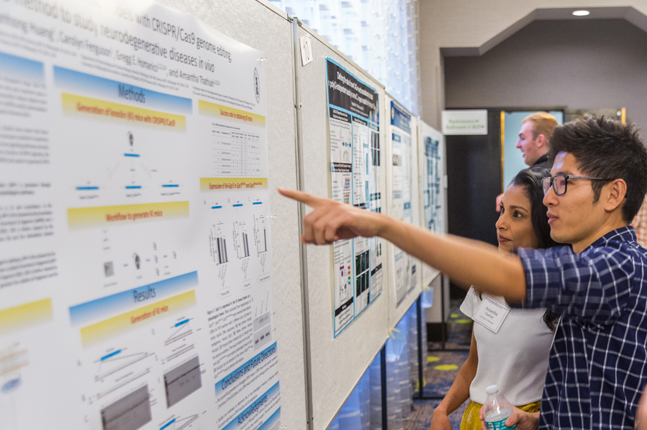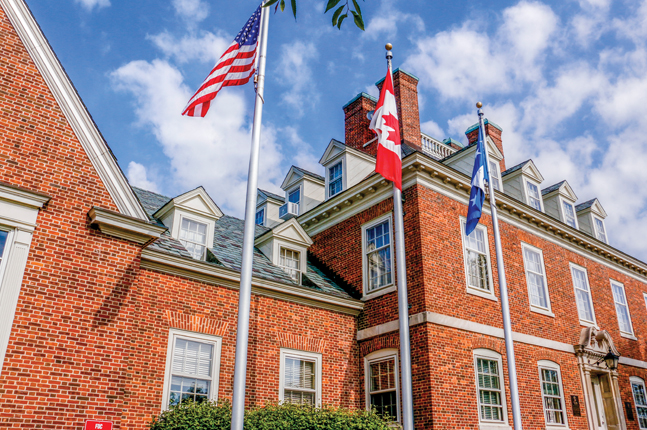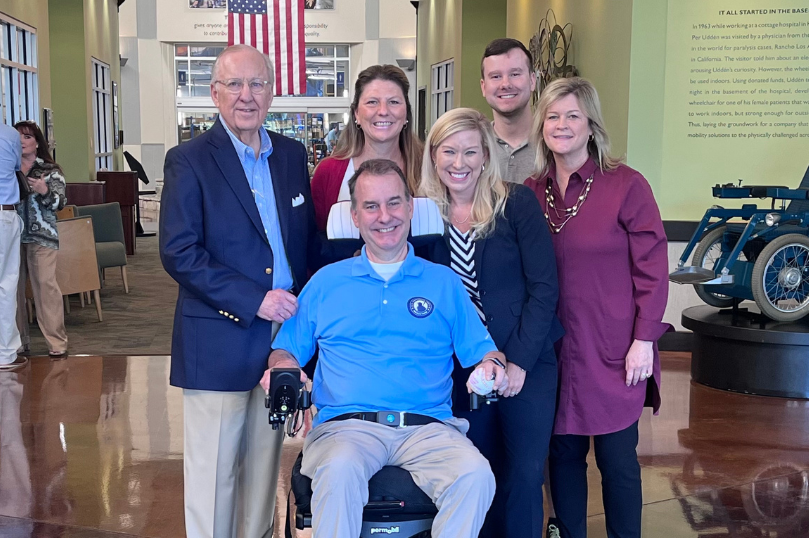The money Phi Delta Theta brothers raised in 2017 for ALS research through the Iron Phi program was put to work last month, with the inaugural LiveLikeLou Emerging ALS Investigators Forum. The Forum, held at The University of Pittsburgh’s Brain Institute August 26-28, was an invitation-only educational event where more than 60 of the most promising young scientists in the ALS research field from 13 universities throughout the United States shared ideas and research methodologies. The $100,000 grant to fund the Forum was the first ALS research grant from the newly-formed LiveLikeLou Foundation, which expects to invest much more in the years to come.
The opening reception for the Forum featured enthusiastic remarks from distinguished leaders from the University’s Brain Institute and School of Medicine, including Dr. Peter Strick, Dr. Mark Gladwin, Dr. Nathan Urban and Dr. Christopher Donnelly, as well as Dr. Rita Sattler from the Barrow Neurological Institute in Phoenix, Arizona.
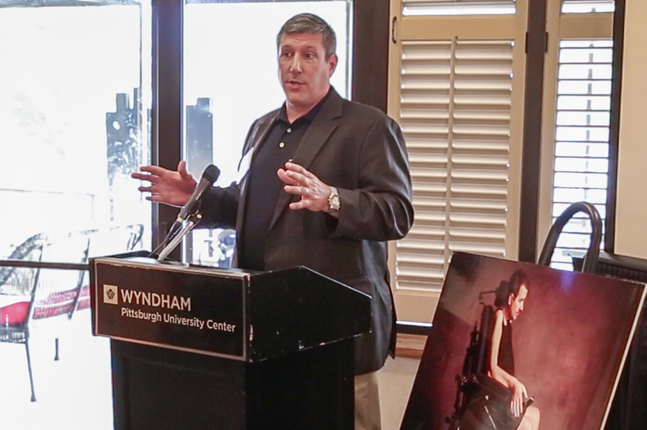
Dr. Chris W. Brussalis addresses the Forum attendees at the LiveLikeLou Emerging ALS Investigators Forum Kickoff Reception
General Council President Dr. Chris W. Brussalis, Allegheny ’87, shared greetings from the 180,000 living members of Phi Delta Theta International Fraternity, whose volunteer efforts for the cause of ALS are focused on raising $4 million in 1848 days to ‘Leave ALS Better Than We Found It’ in honor of Brother Lou Gehrig who died from ALS eighty years ago.
“This is truly cutting edge science, to bring all the rising stars in research together to focus on finding a treatment or a cure for this dreadful disease,” he said. Chris explained the deep connection between Phi Delts and the disease, also called Lou Gehrig’s Disease for baseball Hall of Famer Lou Gehrig, who died from it in 1941, and the goals the Fraternity shares with the LiveLikeLou Foundation to ‘Leave ALS Better Than We Found It.’
“We are committed,” he said.
Brussalis also introduced the Phi Delts in attendance at the Forum, including LiveLikeLou Foundation Board Members Chairman WL Gray, Texas Christian ’70, Vice Chairman Gaylon Morris, Southwestern ’87, Treasurer Greyson Geiler, Nebraska ’93, as well as Phi Delta Theta staff including VP of Growth and Communications Steve Good, Iowa State ’04, Province Presidents Dr. Mark Pleiss, Washington and Jefferson ’11, and Jordan Pallitto, Allegheny ’06, Phi Delta Theta Foundation Advancement Officer Zach Hilliard, Indiana University of Pennsylvania ’13, and undergraduate brothers from chapters at Clarion, Indiana University of Pennsylvania, Robert Morris University, University of Pittsburgh, Carnegie Mellon, Washington and Jefferson, and West Liberty.
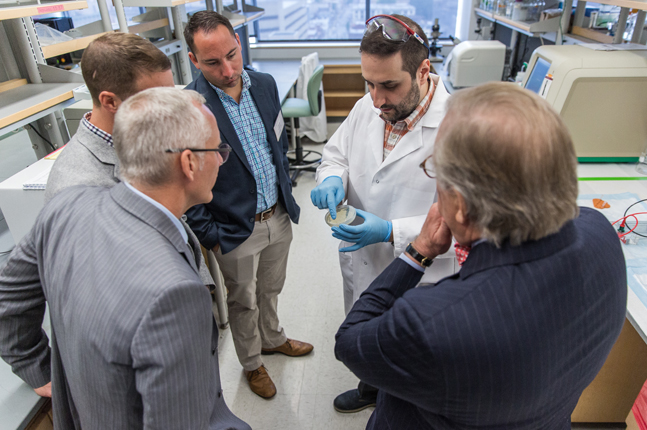
Scientist Joseph Clarke demonstrates part of the process for genetic editing of human cells for research in the laboratory, with Phis from upper left Zach Hilliard, Steve Good, Gaylon Morris and WL Gray
The Forum included a special guided tour of the LiveLikeLou Center for ALS Research, founded in 2015 by Brother Neil Alexander, University of Pittsburgh, who died from ALS that same year. The tour featured detailed reviews of genetic testing models of fruit flies, the latest microscopic and human stem cell technologies, and early information about patents pending from the lab.
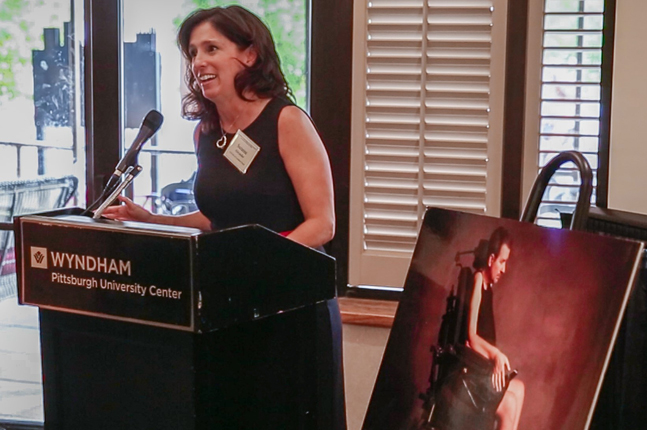
Suzanne Alexander welcomed attendees to the event and told the story of Brother Neil Alexander’s journey with ALS
Neil’s wife Suzanne, Director of The LiveLikeLou Foundation, also gave remarks at the reception, with thanks to donors and encouragement for the scientists in attendance.
“You, my friends, are the point,” Suzanne said. “Please keep doing what you are doing. Keep fighting for the resources, staring into the microscopes, asking the hard questions, and looking for a treatment or a cure. So that the next father, husband, brother, or daughter who gets the diagnosis of ALS has a chance to live.”
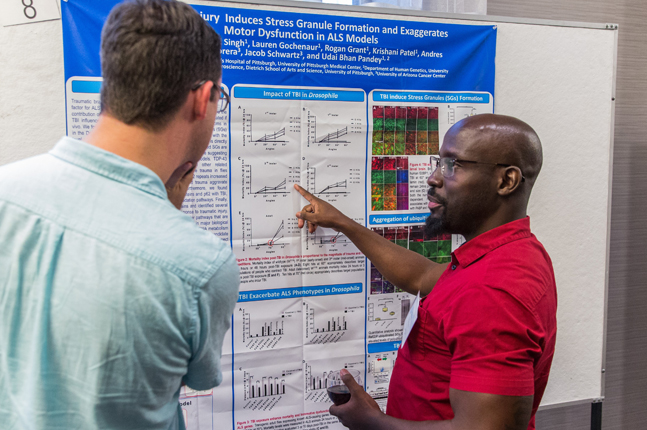
Poster sessions were held throughout the research forum and scientists could share most recent methodologies and findings with each other
LiveLikeLou and ALS Research Funding
The LiveLikeLou Foundation Board of Trustees has become acutely aware that the competition for scientists to get funding for their bright ideas is very high, often leaving newer scientists without sufficient support to pursue new research critical to make progress on the disease. Granting funds for this Forum marked the priority set by the board and Phi Delta Theta to advance discoveries in ALS research.
“The best way for us to make an impact on ALS research is to invest in the up-and-coming researchers; those who don’t yet have funding for their projects but have lots of important ideas and want to share with others in the field,” said WL Gray.
The board is also launching a volunteer scientific committee later this fall, to be led by board member Gaylon Morris. The focus of the committee will be to identify other promising research efforts nationwide to which more grants will be made.
“Phi Delta Theta brothers should feel very proud about the impact we are going to have on ALS,” Gray said.
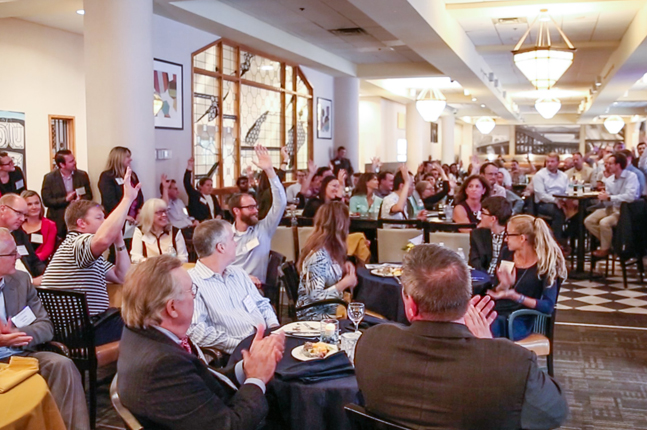
The Kickoff Reception audience applauds a show of hands by the 60 scientists in the room whose sole focus is ALS
Phi Delta Theta’s Contribution to ALS Research
In 2017, 452 members of Phi Delta Theta raised $215,000+ through the Iron Phi program, a program that challenges individuals to complete an athletic challenge of their choice while raising funds to advance the ALS cause and Phi Delta Theta International Fraternity. Ninety five brothers earned the title of Iron Phi in 2017, raising at least $1,000 and accomplishing their athletic challenge. Moving forward in 2018, dollars raised by Iron Phi participants for ALS will support children from families affected by ALS through academic scholarships for higher education and summer camp experiences.
“To be able to show current and future Iron Phi participants that their efforts are truly making an impact on ALS is an amazing thing. As our participants train for their athletic events and reach out to their networks for support, having this in the back of their mind will only drive success,” said Steve Good, Vice President of Growth & Communication at Phi Delta Theta International Fraternity.
In 2017, Phi Delta Theta took a significant step to broaden its reach and deepen its impact on the fight against Amyotrophic Lateral Sclerosis (ALS), the devastating disease named for Brother Lou Gehrig through the launch of The LiveLikeLou Foundation, a stand-alone 501c3 not-for-profit entity with a national scope. Neil and Suzanne Alexander originally established LiveLikeLou in 2011 as a grassroots fund within The Pittsburgh Foundation when Neil, a University of Pittsburgh Phi Delt, was diagnosed with ALS. Phi Delta Theta encourages its members and chapters to support the mission of The LiveLikeLou Foundation through their philanthropic activities.

